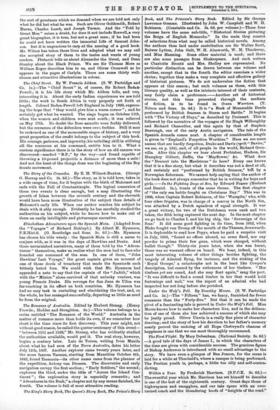The Chief Scout. By W. Francis Aitken. (S. W. Partridge
and Co. ls.)—The " Chief Scout" is, of course, Sir Robert riacitU- Powell ; it is his life story which Mr. Aitken tells, and verb interesting it is. About the early Indian experiences we are told little; the work in South Africa is very properly set forth at length. Colonel Baden-Powell left England in July 1899, express- ing the hope that " they would give him a warm corner "; and he certainly got what he wanted. The siege began on October 11th, when the women and children were sent south ; it was relieved on May 17th. No doubt the Boer assaults were feebly delivered, but the resources of the defenders were eve i feebler. Still it may be reckoned as one of the memorable sieges of history, and a very great proportion of the credit belongs to the subject of this book. His courage, patience, and ingenuity, his unfailing skill in utilizing all the resources at his command, entitle him to it. What a curious significance there is in the story of how an old cannon was discovered—marked "B.F.," by the way—and found capable of throwing a 10-pound projectile a distance of more than a mile ! And not the least of the things done was the beginning of the Boy Scouts movement.


































































 Previous page
Previous page